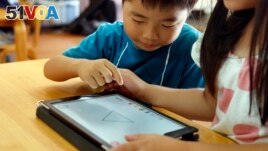11 October 2022
Before a child can read a book, they must know how to read a sentence. Before they can read a sentence, they must know how to read individual words. And before they can read words, they must know letters and learn the alphabet.
To be successful at reading or in any subject at school, students must start with learning the most basic knowledge. And many students around the world are not learning these basic skills, also called foundational learning. The problem and possible solutions were recently discussed at the United Nations' Transforming Education Summit. Conference attendees said that while the problem already existed before the COVID-19 pandemic, the health crisis made it worse.
"This is a global learning crisis," said UNICEF director Catherine Russell. "Millions of children are still out of school. And millions of children are in school ... but not learning the basic skills."

FILE - Children work on a digital program at Coby Preschool in Yoshikawa, suburban Tokyo, on an assignment, which was to draw on a triangle on an iPad, July 12, 2018.
UNICEF found that two out of every three children around the world cannot read and understand a simple story by age 10. This was a 12 percent increase since before the pandemic. Three-quarters of children by grade four also do not have basic math skills.
In poorer countries, the numbers are even worse. Just one in 10 children in sub-Saharan Africa have basic reading skills by grade three.
"Learning poverty fuels economic poverty," Russell said.
UNICEF found that long school closures during the pandemic greatly worsened educational inequality around the world. Millions of children left the educational system during the pandemic, and many still have not returned to the classroom. In 2021, UNICEF estimated that 244 million children between the ages of 6 and 18 were out of school.
Ibrahim Natatou is the secretary of education of Niger. "This is not the same situation in developed countries," he told the UN meeting. "For us it's a disaster."
Natatou said Niger and other sub-Saharan African countries are currently at war, which adds to the current educational system problems. He said there is also a lack of good teachers. Natatou noted that 57 percent of primary school teachers in Niger do not have good writing and reading skills, and schools are often in poor condition.
Despite these very large global difficulties, leaders see the pandemic as a chance to change education for the better. As a part of the meeting, the U.N., World Bank and other organizations urged governments to take action on the foundational learning crisis. Countries like the U.S., Britain, Sierra Leone, Egypt and Bulgaria have come together to sign a promise to improve foundational learning.
Eleonora Villegas-Reimers is an education expert at Boston University. She said, "We are dealing with the pandemic still, but it's a very, very important opportunity for us to transform education." She added, "Governments around the world have been asked to take a stand and commit to ensure children develop foundational skills."
In Niger, Natatou said there has already been some progress. More training and support have been provided to teachers. And, officials are working to get computers to all students across the country.
Julius Maada Bio is the president of Sierra Leone. He said his country has been able to increase school enrollment by 50 percent through its free quality education program. He also said more girls and children from poor and rural areas are now attending school. Maada Bio added that schools across the country are now providing children with free warm meals as well.
"We owe our children a future of promise, where as productive citizens we continue to build inclusive, equitable and peaceful societies," he said.
I'm Dan Novak.
Dan Novak wrote this story for VOA Learning English based information from UNICEF and the World Economic Forum.
______________________________________________________________________
Words in This Story
global — adj. involving the entire world
opportunity — n. an amount of time or a situation in which something can be done
transform — v. to change completely and usually in a good way
commit — v. to say that someone will definitely do something
enroll — v. to become a member or participant
inclusive — adj. covering or including everything